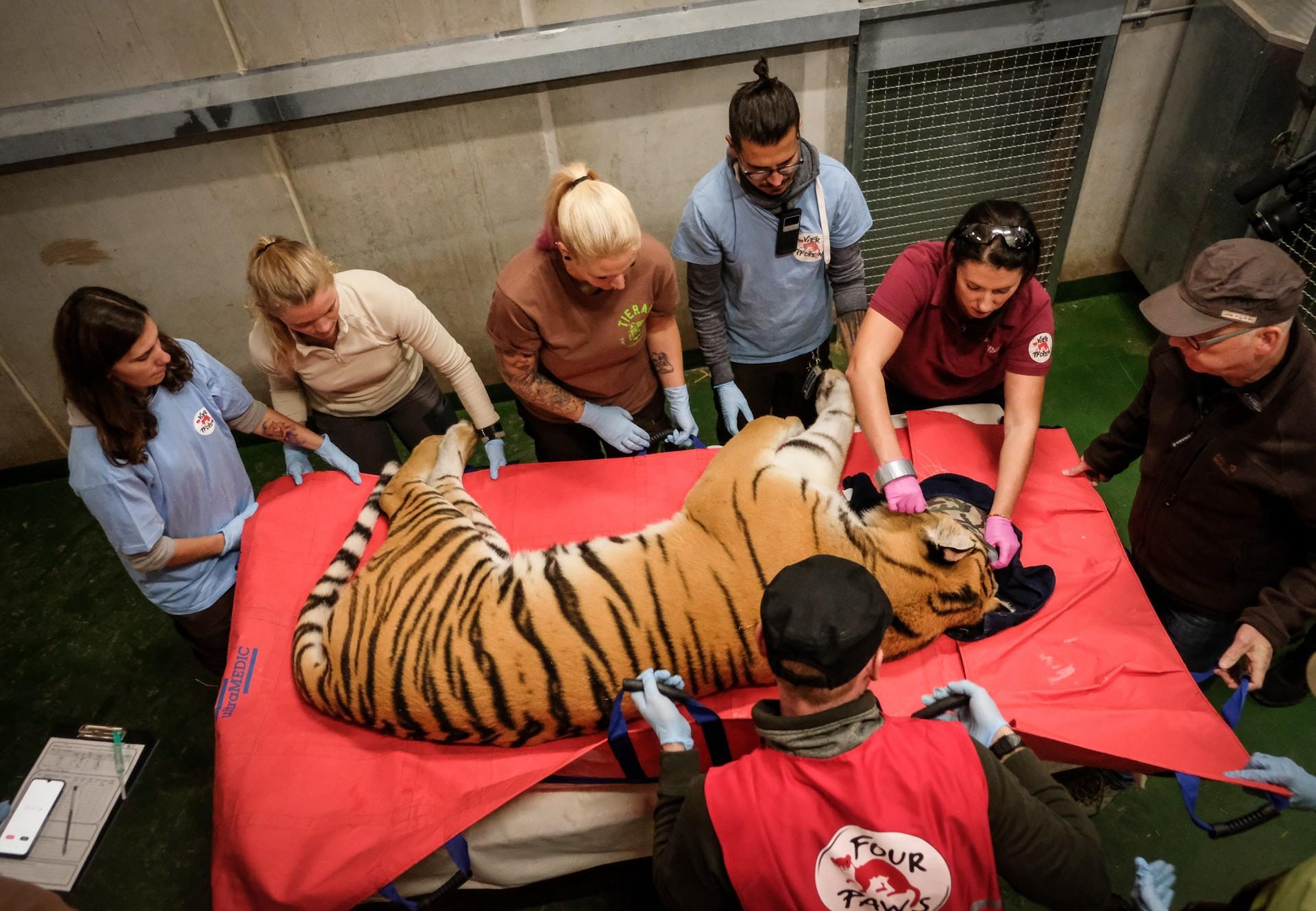
Big Cat Rescue
How FOUR PAWS undertakes big cat rescues and provides lifelong care at our big cat sanctuaries
The Netflix docuseries, Tiger King, and the feud with Carol Baskin of Big Cat Rescue, has put big cats in the national spotlight. In this article, we will discuss how FOUR PAWS is rescuing big cats, why big cats need rescuing, where they go once rescued, and how you can help.
The Problems with Big Cats Today
Thousands of big cats live in very poor conditions in circuses, zoos, and private ownership all across the world today. Uncontrolled breeding causes "surplus" animals that either end up dead or traded to unsuitable places.
FOUR PAWS believes that big cats should not be kept as pets or for entertainment. These wild animals suffer in captivity under inadequate keeping conditions including lack of expert care, frequent traveling, harsh training and intensive interaction with humans.
Sadly, exotic and wild animals are not only kept in zoos and traveling shows but also in people's living rooms and backyards. From the perspective of animal welfare, wild and exotic animals are completely unsuited for private keeping and their complex behavioral, physical, and environmental needs make them ill-suited for life in captivity. In contrast to domesticated species like dogs and cats, wild animals have not adapted to life in human care even over hundreds of years.
Big Cats in America
The private ownership of big cats, such as lions and tigers, remains a huge animal welfare and human safety issue. Between 5,000 – 10,000 big cats are estimated to be in private ownership in the U.S.[1]
However, the actual number is unknown, as there is no federal law or comprehensive regulatory system in place to document how many captive-bred big cats are kept by private owners. Instead, laws and regulations on private ownership of exotic animals fall to state governments and vary wildly by state, creating confusion, loopholes, and an ineffective method for regulating these dangerous wild animals.
For instance, in Texas you can buy a tiger for less than $1,000 and are merely required to purchase a permit from the state’s wildlife department. Four other states don’t even go that far and have no law in place that directly regulates or controls the private possession of wild or exotic animals. Overall, the confusing patchwork of state laws (some states ban big cats as pets, some have only partial restrictions, and some merely require a permit) results in ineffective enforcement and completely fails to protect public safety and animal welfare.
Big cats like lions and tigers are not simply larger versions of a domesticated house cat. These species have specific needs that a private household and life in cage will never be able to fulfill. As naturally wild animals, owners attempt to “tame” big cats through cruel handling and barbaric treatment, including declawing and defanging them, thus crippling and subjecting the cats to a life of chronic pain and debilitation. Even with these extreme measures, big cats retain their wild instincts and many accidents and deaths have occurred over the years involving the owners and general public. Too often such incidents result in the big cat’s death.
Sanctuaries today are filled to capacity with big cats who were either: relinquished to them by owners who could no longer afford to feed and care for the animals; confiscated by law enforcement due to neglect, abandonment, or animal cruelty; or rescued from exploitative roadside zoos, circuses, exotic animal auctions, and other public attractions.
For the many places offering cub petting opportunities across the country, they need a constant stream of cubs younger than 12 weeks old for public interactions. This need creates a vicious cycle of tiger breeding, animal abuse, and trading of hundreds of big cats among private owners, with no accountability for what happens to those big cats once they are no longer wanted or needed.
Progress for Big Cats in the U.S.
In December 2022, the Big Cat Public Safety Act was signed into law by President Biden. This monumental law prohibits keeping tigers, lions, and other big cat species as pets and bans public interactions with big cats, including cub petting. It also requires current owners to register their big cats with the U.S. Fish and Wildlife Service, resulting in the first required nationwide system to document how many captive-bred big cats are kept by private owners in the U.S.
FOUR PAWS Sanctuaries for Big Cats
LIONSROCK Big Cat Sanctuary
Located in Bethlehem, South Africa, this sanctuary sprawls over 3,000 acres of beautiful grasslands, hills and plains, and serves as home to over 100 rescued animals, most of which are big cats saved from war-ravaged zoos, circuses, private ownership, and the canned hunting industry.
FELIDA Big Cat Sanctuary
Located in Nijeberkoop, Netherlands, this sanctuary offers specialized and intensive care of traumatized big cats.
TIERART Wild Animal Sanctuary
Located in western Germany, this sanctuary encompasses a total area of approximately 35 acres and houses many different species of animal from tigers to foxes.
